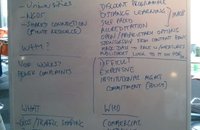The Future of Bandwidth Management?

Who should do it?
Who should be doing Bandwidth Management? Who benefits/would benefit most from it?
- Universities
- Small organisations
- Internet providers (ISPs)
- Anyone with a shared connection (finite resource)
Why should they do it?
- To download important documents and files
- To make VoIP work
- To reduce complaints from users (University VCs get a lot of complaints)
- To avoid abuse of contended resources (ISPs live on contention ratios)
How can we do it?
Two main approaches:
- Quality of Service (QoS) guarantees, traffic shaping
- Traffic quotas (BCrouter, RADIUS, pmacct, pmGraph)
Quotas tend to be used:
- by large organisations
- where all users are approximately equal (e.g. ISPs, students in a university)
- where it's hard to block certain types of traffic (politically or practically)
- and it's OK to penalise some users for legitimate heavy usage
Tools:
- Linux TC
- BSD PF and ALTQ
- Untangle (free download or hardware boxes)
- NetEnforcer
- PacketFence
- Packeteer
- Cheap Linux-based routers and APs
- RADIUS 802.1x authentication
Why do we not do it?
- Tools exist, but:
- Extremely high level of technical skill required to do it well
- (Over-)Simplified by expensive commercial tools with point-and-click interfaces
- High cost in time (free) or money (commercial)
- Lack of commitment/policy from institution/organisation management
- Lack of value? Or lack of recognition of value?
- Lack of funding/finance for promotion, training, tool development
What can we do about it?
Things that might encourage more people to adopt good bandwidth and network management:
- Encouragement/support/training from NRENs to universities
- A roving team of experts: NREN, UbuntuNet or Network Engineers Without Borders (NEWB)
- Need to ensure that we build capacity instead of leaving an unsustainable solution
- Persuade senior management of the opportunity costs/alternatives: "you can save money by optimising your existing connection instead of upgrading"
- Online learning programme for cheaper mass distance education
- Self-paced learning programme with accreditation
- Stop trying to develop better GUIs for open source and give in to commercial alternatives?
- Sponsorship for training from vendors, publishers, Facebook?
And one particular tool proposed: a speedtest/bandwidth map that lets (university) users measure their own network performance (page loading times), rate them, and compare with other institutions in the area. Reasons:
- Empower non-technical users to understand their situation
- Empower them with hard evidence to present to senior management
- A public commendation/embarrassment/incentive to organisation management
- Try to get to the top of the league table!
- Provide data for the bandwidth map (web accessibility) project
How to make it happen:
- Hack day to create the software
- Tell people about it in AfNOG
- Encourage publishers to link to it from their PDF download pages
